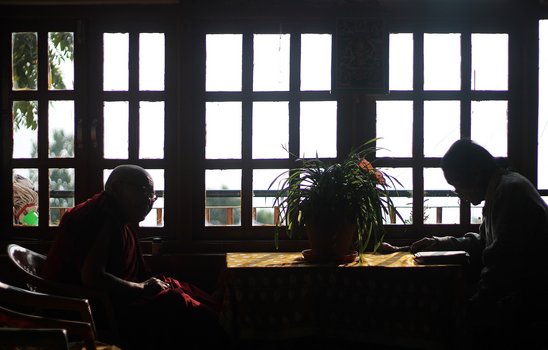
A nun and a man at an old age home for Tibetans in India. Photo: Harmandeep Gill
Harmandeep Gill: Aging in Exile: Experience of Good Old Age among Elderly Tibetans in India and Nepal
Following the Chinese occupation of Tibet, the Dalai Lama, Tibet's highest spiritual leader entered exile, India in 1959. He was followed by thousands of Tibetans. The first Tibetans to escape from Tibet did not plan to settle down in exile, but rather hoped to return to Tibet within a few years. However, today they find themselves growing old in exile.
Elderly Tibetans lead lives often characterised by uncertainty, partly due to their status as 'refugees', but particularly due to the large on-migration in recent years of exile-Tibetan youth to Western nations. This has left many elderly alone in the last phase of their lives. While in Tibetan traditional society the parent-children relationship was guided by 'filial piety', making old parents the responsibility of children, in exile, however, Tibetan old age homes have become the last resort for many. Spending the last phase of life in an old age home or dying alone without the presence of children and close kin is regarded as something unwanted and even shameful by some tibetans. Dying among family members is regarded as a 'good' death, which is also believed to increase the chances for a good rebirth. Dying alone on the other hand, without a calm mind, unfulfilled wishes, or negative emotions which the absence of family can possibly give rise to, is regarded as a 'bad' form of death. This project asks: How does the current situation in exile affect the elderly Tibetans' experience of old age? At stake is not only their well-being in the last phase of their lives, but also, in the context of their Buddhist faith, their next life.